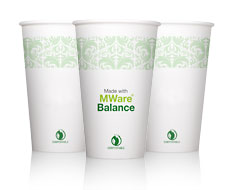In today’s eco-conscious world, sustainability is no longer a “nice to have”; it is a “must-have” for foodservice brands and an imperative to operate by every day. In fact, 93 percent of corporate CEOs say that sustainability will be critical to the future success of their companies, according to “A New Era of Sustainability: UN Global Compact-Accenture CEO Research,” a study from 2010. At MWV, we’ve identified several crucial issues that foodservice operators should consider when they think about their sustainability programs both now and into the future.
Packaging Innovations
One factor that consumers and businesses alike should be mindful of in their efforts toward sustainability is packaging. Packaging is part of our daily lives—virtually everything we purchase, ship, consume, or make comes in some kind of a package. As a result, approximately 23 percent of all landfill waste is packaging, according to the Environmental Protection Agency, and disposables from the foodservice industry are a known contributor to this waste. Given packaging’s prominent role in our lives and businesses, the packaging industry has a responsibility to create more sustainable solutions for brand owners, including alternatives for disposal.
Packaging materials such as paperboard, made with fiber from responsibly managed forests, 100 percent renewable fiber, post-consumer recycled content, or treated with plant-based coatings, give the foodservice industry opportunities to integrate sustainability into every step of the packaging development process. For example, MWare’s foodservice paperboards from MWV contain a range of substrates specifically designed to address the functional needs of foodservice containers. They’re balanced by a host of environmental benefits, such as being made with renewable energy, including up to 30 percent post-consumer recycled fiber, using plant-based coatings, or being certified compostable.
Today, many of the world’s biggest brands are looking for packaging solutions that incorporate sustainability. For example, Starbucks had the industry’s first hot beverage paper cup made of 10 percent post-consumer recycled fiber, and it introduced a new plastic cup in 2009 that has less of an environmental impact than its original plastic cups.
Recycling and Composting
Many foodservice operators already have successful recycling programs, but are looking for additional ways to reduce their impact of packaging waste. Composting is one such step in developing more sustainable solutions because it actually leverages food-contaminated paperboard once it reaches the end of its usable life.
At MWV, we recommend the use of a commercial composting program for foodservice operators, as they are typically better equipped to handle the widest range of food and materials across the full spectrum. The results of such a program can have a significant impact.
For example, the city of San Francisco created the first large-scale urban collection of food scraps, plant trimmings, and soiled paper for composting in the country. Around 5,000 restaurants contribute to more than 600 tons of food scraps and other compostable material that Recology, the city’s composting service, receives each day.
At MWV’s global headquarters in Richmond, Virginia, our on-site foodservice operation diverts 12 tons of food and foodservice packaging waste from landfills each year by separating trash in the clean-up area and sending compostable waste to a local commercial composter.
The Big Picture
Choosing certified, recyclable, recycled content or compostable packaging materials are important facets of sustainability for foodservice operators, but they are certainly not the only factors to consider. If sustainability is a key part of your operations and particularly your brand promise, you must also consider incorporating green thinking in terms of water, energy, and environmental efficiency.
Environmentally conscious businesses need to work on many levels to reduce their impact on the environment. One way we do this at MWV is by using carbon-neutral, renewable, biomass-based byproducts for 67 percent of all energy requirements at our U.S. manufacturing facilities. By responsibly using natural resources, we’re reducing our own carbon footprint, and we encourage companies both large and small to find similar ways to do the same.
We also support a comprehensive energy policy, internally and externally. This helps ensure sustainable practices are followed throughout the supply chain, holding suppliers to the same rigorous standards to which we adhere. By choosing to only work with vendors who are as committed to sustainability as you are and by making sure they are focused on continuously developing innovative solutions, you can work together to minimize waste and maximize return on the environmental investment.
While MWV has made tremendous progress in our own sustainability practices, we know we don’t have all the answers. Our industry must collectively reduce packaging’s impact on the environment through the way we all think, act, and inform. When sustainability practices are an integral part of your long-term business strategy, both the environment and your own bottom line see the benefit. If you want to remain competitive in today’s eco-conscious world, sustainability and environmental responsibility are critical.











